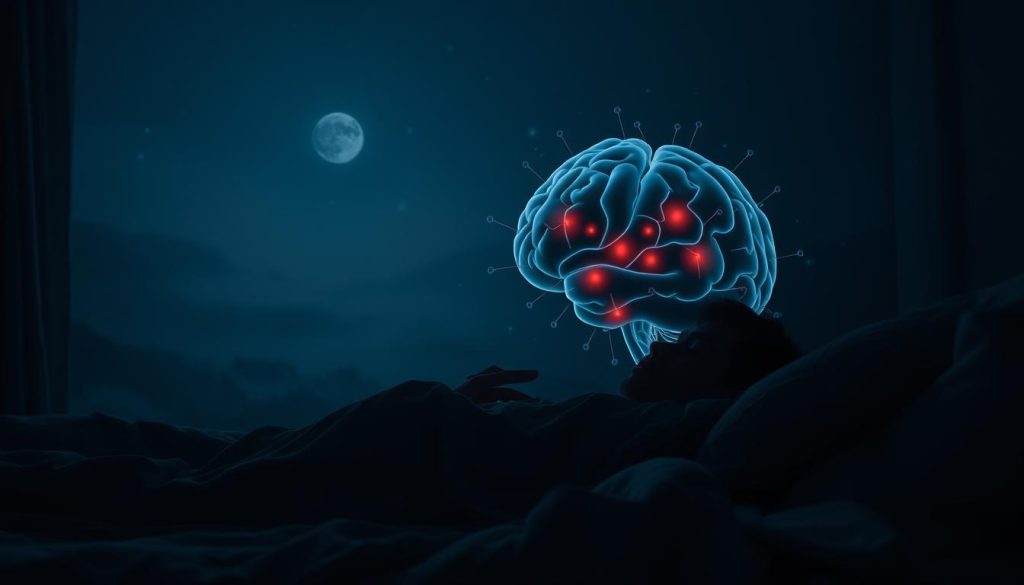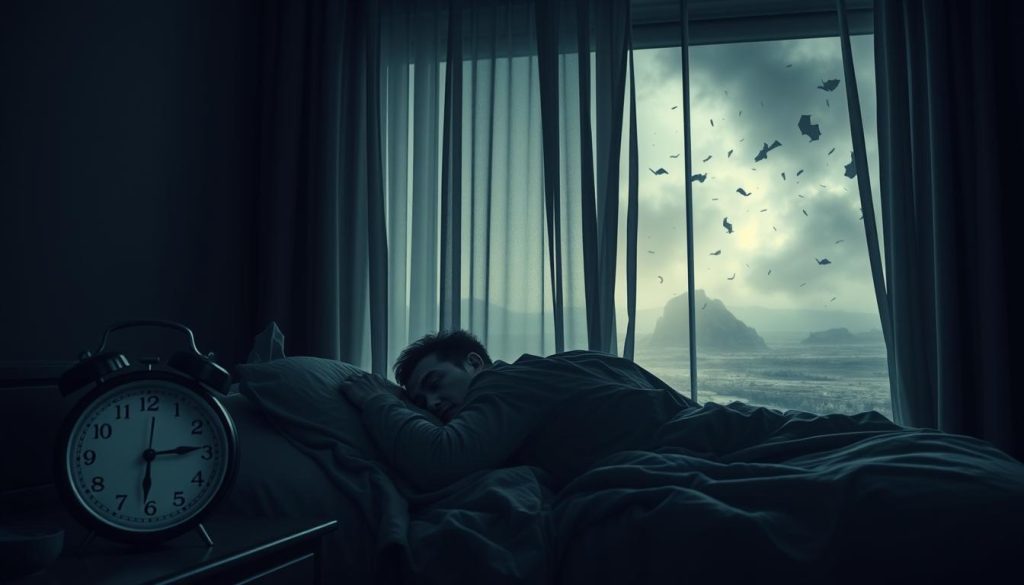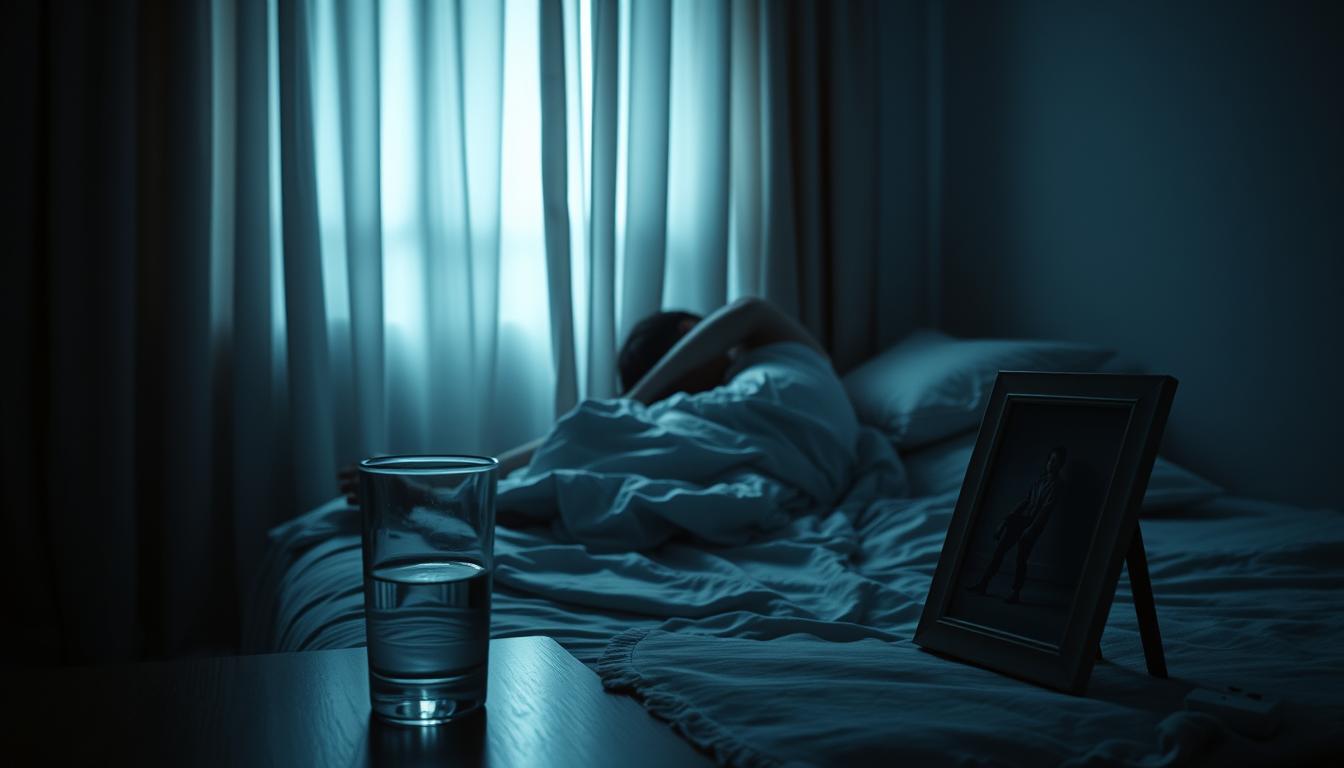Research into depression and circadian rhythm is growing. Our internal clock, or circadian rhythm, controls important body functions. This includes sleep, hormone levels, and mood. When this rhythm is off, it can affect our mental health, especially with depression.
Understanding the importance of a balanced circadian rhythm is key to mental health. Let’s explore how these two are connected. We’ll look at how depression is linked to our body’s internal timing system.
The Science Behind Circadian Rhythms
Understanding circadian rhythms is key to knowing how our body’s clock affects health. These 24-hour cycles, controlled by genes, help regulate many body functions. They ensure our body works in sync with the world around us.
The brain’s suprachiasmatic nucleus (SCN) mainly controls these rhythms. It works with other clocks in the body to keep things running smoothly. This includes hormone release, body temperature, and mood. When our clock is off, it can cause mood issues and other health problems.
Here’s how circadian rhythms affect our body:
| Physiological Function | Role of Circadian Rhythms |
|---|---|
| Sleep | Regulates sleep-wake cycles, ensuring restorative sleep. |
| Metabolism | Aligns metabolic processes with periods of energy consumption. |
| Mood Regulation | Helps in the release of mood-related hormones, reducing the risk of mood disorders. |
| Body Temperature | Synchronizes temperature fluctuations to optimize bodily functions. |
| Hormone Release | Ensures timed release of hormones such as melatonin and cortisol, vital for circadian regulation. |
Our biological clock working well is crucial for good health. Knowing how it affects us can help us make better choices in life.
How Depression Affects the Biological Clock
Depression changes how our body’s clock works, causing big problems with our sleep patterns. It messes with the genes that control our internal clock. This is key to understanding how depression and our body’s clock are connected.
Interaction Between Depression and Circadian Genes
Studies show that depression can change how our genes work for the clock. These changes can lead to mood problems and other issues. This makes it hard for our body to keep in sync with the day-night cycle.
Impact on the Sleep Cycle
Depression also messes with our sleep, causing sleep disorders. People with depression might have trouble sleeping or staying asleep. This makes their mood problems worse, creating a cycle of poor mental health. Fixing these sleep issues is crucial for better mental health.

The Role of Melatonin and Serotonin
Melatonin and serotonin are key in managing mood and our body’s internal clock. Melatonin, called the “sleep hormone,” is made by the pineal gland when it’s dark. It tells our body it’s time to sleep, keeping our sleep and wake cycles in sync with day and night.
Serotonin, a mood regulator, also affects our internal clock. It’s at its highest during the day, helping us stay alert and feeling good. It turns into melatonin, linking mood and sleep. If serotonin is off, it can mess with our mood and sleep patterns.
When melatonin or serotonin levels are off, our body’s clock gets mixed up. This can cause sleep problems and mood swings. Depression, linked to low serotonin, can make this worse. Fixing these imbalances can help our body’s clock and improve our mental health.
| Neurotransmitter | Function | Effect of Imbalance |
|---|---|---|
| Melatonin | Regulates sleep-wake cycle | Circadian rhythm disruption |
| Serotonin | Regulates mood and alertness | Depression and circadian disruption |
The Connection Between Sleep Disorders and Mood Disorders
Sleep disorders often go hand in hand with mood disorders. This creates a challenging cycle that can be hard to break. Both insomnia and hypersomnia are common in people with depression. These sleep issues can make mood symptoms worse, leading to the need for integrated treatment strategies.
Types of Sleep Disorders Linked to Depression
Insomnia is a common sleep disorder linked to depression. It makes it hard to fall or stay asleep. People with insomnia often feel tired, irritable, and see a decline in their mental health.
Hypersomnia, on the other hand, is excessive daytime sleepiness. This happens even when someone has gotten enough sleep at night. It can really hurt daily life and make depressive symptoms worse.
Treatment Approaches for Sleep-Related Mood Disorders
Effective treatment for sleep-related mood disorders needs a holistic approach. Cognitive Behavioral Therapy for Insomnia (CBT-I) is a key method. It helps change sleep habits and thoughts about sleep.
Medication can also be used to treat both sleep and mood issues. This ensures a complete treatment plan. Keeping a regular sleep schedule and creating a good sleep environment are also key.

Depression and Circadian Rhythm: Unveiling the Link
The connection between mental health and our biological clock is fascinating and complex. Studies show that problems with our internal clock can lead to depression. This means that how our body’s rhythm works can affect our mood and mental health.
There are several reasons why this link exists. For one, changes in our internal clock can mess with hormone levels, like cortisol. This hormone is linked to stress and depression. Also, changes in genes that control our clock can affect how we feel, making it harder to manage our mood.
Another important factor is how disruptions affect neurotransmitters like serotonin and melatonin. These chemicals help us feel good and sleep well. When they’re off, it can make us feel down and affect our sleep patterns. This shows why keeping a regular sleep schedule is key for our mental health.
| Factors | Impact on Biological Clock | Link to Depression |
|---|---|---|
| Hormonal Secretion | Abnormal cortisol levels | Increased stress and depressive symptoms |
| Genetic Factors | Changes in circadian genes | Influence on mood regulation pathways |
| Neurotransmitter Balance | Serotonin and melatonin disruption | Affects sleep and mood stability |
| Sleep Patterns | Irregular sleep-wake cycle | Increased vulnerability to depression |
How Circadian Disruption Can Lead to Psychiatric Symptoms
Circadian rhythm problems can really hurt mental health, making symptoms of depression worse. It’s important to know how these issues show up to manage mental health well.

Symptoms of Circadian Rhythm Disruption in Depressed Individuals
People with depression might feel mood swings, extreme tiredness, and trouble focusing. These signs can make them feel more irritable and anxious. Spotting these symptoms early is crucial for quick help.
Strategies for Managing Psychiatric Symptoms
To tackle these symptoms, we need a mix of lifestyle changes and professional help. Keeping a regular sleep schedule can help stabilize mood. Also, staying active and getting sunlight is key for a healthy circadian rhythm. For serious cases, seeing a mental health expert is a good idea. They can offer therapies or medications to help.
Impact of Light Exposure on Mental Health
Being in natural light greatly affects our mental health. It changes how we feel and our body’s internal clock. Morning sunlight, for example, boosts serotonin levels. This helps us feel better and stay focused.
Artificial light is also key, especially when natural light is hard to find. Light therapy, using light boxes, helps with mood disorders like Seasonal Affective Disorder (SAD). It tricks our body into thinking it’s sunny, helping our mood.
Light also controls melatonin, the sleep hormone. Getting the right amount of light at the right time improves sleep. This is crucial for our mental well-being. Knowing how light affects us can help manage mood disorders.
Natural Methods to Realign Your Biological Clock
To naturally achieve optimal circadian alignment, it’s important to make lifestyle changes. These changes should focus on a consistent sleep schedule and good sleep hygiene. Eating right and staying active also help keep your circadian rhythm in balance.
Importance of a Consistent Sleep Schedule
Keeping regular sleep and wake times is key to a stable biological clock. Sticking to a schedule, even on weekends, boosts your sleep quality. This helps your body’s internal clock stay on track, making it easier to fall asleep and sleep better.
Role of Diet and Physical Activity
Diet and exercise are crucial for circadian alignment. Eating balanced meals at set times helps keep your metabolism in sync. Morning sunlight and exercise improve your circadian rhythm and sleep quality. These changes help create a healthier, more synchronized biological clock.
Technological Solutions to Regulate Circadian Rhythms
New tools are coming out to help keep our circadian rhythms healthy. We’ll look at wearable devices, smart lighting, and sleep apps. These tools aim to improve sleep and overall health.
Wearable Devices
Wearable tech like Fitbit and Apple Watch track your sleep and health. They monitor sleep cycles, heart rate, and activity. This data helps users improve their sleep and daily life.
Smart Lighting and Apps
Smart lighting systems change how we interact with light at home. Brands like Philips Hue and LIFX adjust light to match day and night. Apps like Sleep Cycle and Pillow help create the best sleep environment.
Professional Treatments for Circadian Rhythm Disorders
Treating circadian rhythm disorders, especially when tied to depression, requires specialized approaches. These include sleep medicine and psychiatric treatment. Chronotherapy is a key method, adjusting sleep schedules to realign the body’s internal clock.
Chronotherapy involves gradually moving the sleep-wake cycle to a more conventional schedule. This is especially helpful for those with delayed sleep phase disorder (DSPD), which often goes hand in hand with depression. Light therapy is another effective treatment. It involves controlled exposure to bright light at specific times to reset the circadian clock, enhancing mood and sleep.
Cognitive-behavioral therapy for insomnia (CBT-I) is also a valuable option. It targets the mental health aspects of sleep disturbances. These therapies are based on evidence and help change negative thought patterns and behaviors related to sleep.
For a complete treatment plan, a mix of these methods is often used. This is done under the guidance of experts in sleep medicine and psychiatry. This approach tackles both the physical and mental sides of circadian rhythm disorders and their link to depression.
Personal Stories: Overcoming Depression and Circadian Rhythm Challenges
Personal stories about mental health are incredibly powerful. Take Jane, a software engineer from San Francisco, for example. She faced endless deadlines and irregular sleep, leading to depression. With cognitive behavioral therapy (CBT) and phototherapy, she learned how her circadian rhythm affected her mood.
By setting a regular sleep schedule and using morning light, Jane’s mood and work performance improved. Her story shows how changing our biological clocks can greatly improve our mental health.
David’s journey also highlights the importance of adjusting our circadian rhythms. As a night shift nurse, he battled the mental health effects of his schedule. He started using light therapy glasses and taking breaks to rest.
These changes helped realign his body’s internal clock and boosted his mental health. David’s story proves that small changes can lead to big improvements in our lives.
Jane and David’s stories show us that beating depression linked to circadian issues is possible. Their experiences offer hope, showing that with the right approach—like proper light, regular sleep, and professional help—mental health can improve. By sharing these stories, we hope to inspire others to take care of their mental health.

